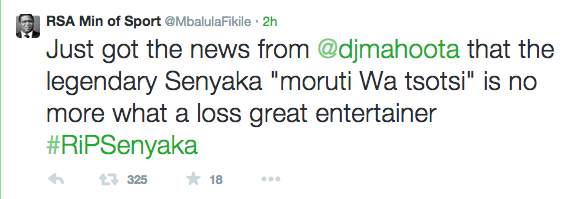Senyaka Kekana was known for hits such as Chisa Mpama and Romeo wa Nkolota.
Kwaito group Trompies member and President of the South African Music Industry Council Eugene Mthethwa has confirmed the death of Kwaito star and actor Senyaka Kekana. The pair collaborated on each other’s albums. Mthethwa told the Mail & Guardian that Kekana was ill and passed away at his family home in the Vaal on Wednesday morning.
Both Minister of Sport and Recreation Fikile Mbalula and fellow Trompies member and producer Zynne “DJ Mahoota” Sibika first announced the news of Kekana’s death on social media. Sunday World reports quoted Mbalula saying: “This came as a shock, it came like a tsunami because we did not expect it as we never heard news of him being sick.”


According to Mthethwa, Senyaka was best known for his quirky, controversial and humorous lyrics and succeeded in reinventing his image and sound over the years. In 1986 he released a hip-hop album which featured the hit single Go Away.
Kekana “was the first artist to rap on a disco music, locally known as bubblegum music in the 80s”, says Mthethwa.
In April 2014 he opened his home to the M&G during a photoshoot for the article Freedom marches to kwaito’s drum. Kekana had his own recording studio in an extended room at his house. He was chirpy and welcoming; he attributed his talent to God and felt he had to share his talent with others.
His interests also included acting. He starred in the local comedy film Moruti wa Tsotsi, which was the story of a sketchy and fake priest. Responding to claims that Kekana was planning on releasing a new album, Mthethwa told M&G: “I hadn’t heard from him saying so but I am told that he was working on a new album.”
Trompies member Eugene Mthethwa says he last saw Kekana four weeks ago. “He was in high spirits; but he was always like that. Senyaka is one person who you wouldn’t find laying down feeling sorry for himself. He was one person who never stopped laughing and joking. He had a funny way of putting things across, and that is what I will remember him for.”
The creativity in Senyaka’s work was unmatched. He gave fans hits such as Chisa Mpama with DJ Walker, Romeo wa Nkolota, Satane-O-Maponapona and Fong Kong in 1998 under the name the Hunger Boyz. The Hunger Boyz duo consisted of Kekana and his childhood friend Kamazu. The song Fong Kong addressed counterfeit and low-quality items sold by Chinese shop owners in South Africa.
“We wrote this song as a protest against what the Chinese were doing to the black man,” Senyaka said in a 2010 M&G article.
“We were like, how could they come here and do this when we were hosting them so well. They would sell you takkies that were like rotting pieces of meat. In two weeks the things would just literally rot on your feet.” The word “fong kong”, which refers to fake items, has now become part of the South African colloquial language.
The Hunger Boyz project enabled Kekana to make the shift from hip hop to kwaito. “I believe that he is the founder of Kwaito. He maintained the prominence in that particular music post 1994,” says Mthethwa. “He probably started kwaito before time and when we revived it post 1994 he still continued to be relevant up until today.”